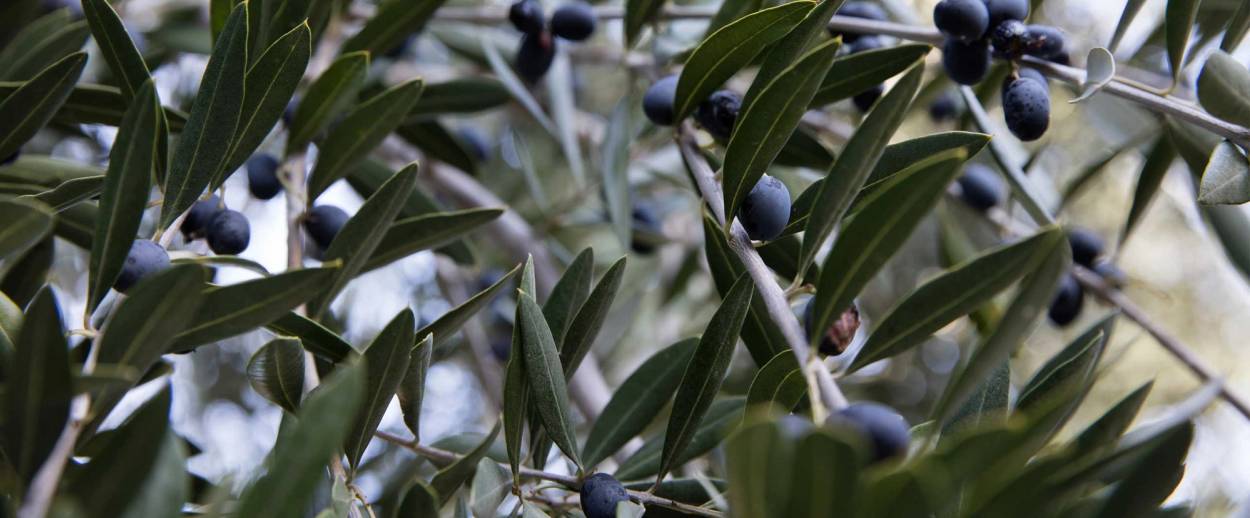My Hanukkah Gift
A writer’s reflections on her olive grove and a holiday ritual




It’s surely just a coincidence that in Italy, where I have a home, the olive harvest generally takes place in the month or so before the most oil-centered of Jewish holidays.
For me, though, the olive harvest and subsequent production of oil provide a parallel seasonal ritual, in which bruschetta, or grilled bread drenched in dense new oil, provides the ceremonial flavor.
My family and I have property in an olive-producing area of Umbria, in central Italy, where the landscape is a hilly mix of forest and farmland, and many of the slopes are covered with groves of olive trees.
Umbria is home to several big olive oil concerns, with huge groves comprising thousands of trees. But many people, like me, have small private holdings that provide enough oil for their own needs, as well as a portion left over for sale.
On our land, we have several dozen olive trees. I keep most of them pruned, but otherwise, I admit, I’m a very poor farmer. I don’t plow or fertilize or do much else to care for them; I regard what they produce as something of a gift, and only about half of the trees, in fact, bear fruit.
Still, each November sees me out in the field, gathering olives and then having them taken to a local frantoio, or olive press, where they are turned into oil.
The picking process is hard, repetitive work, but it’s simple. I spread a net on the ground at the base of each tree and then strip the branches, using my fingers or an orange plastic hand-rake specially made for the job.
In Umbria we pick olives before there are overly ripe, so that you have to really pull them off. They are green and purple and brown as well as a mature black, and I love the little tug and the sound they make as they detach from their stems. The ripe black olives look luscious, but there is no temptation to sample them: raw olives are intensely bitter, inedible unless dried, salted, or processed in brine.
Sometimes friends come by to help me pick, but most of the time I do the job alone. I like it. The mechanical action of reaching up to strip the fruit induces a meditative state: I see olives when I close my eyes. Hanukkah is the festival of light and rededication, and in a way the process of picking is one of renewal. On quite a few occasions, with my thought processes detached from the physical activity, I have been able to sort my way through complicated writing problems or other issues.
Once off the trees, the olives are placed in plastic crates, each of which holds between 20 and 25 kilos, and taken to the frantoio. You need a certain amount to be pressed and processed at one time, usually about 300 kilos. With my small yield I rarely have enough for this, so I usually give my olives to a neighbor who takes them to the frantoio with his.
This year was a particularly poor harvest, for me but also for many of my neighbors. All told I got just 120 kilos—though I know I left olives still clinging to high branches that I could not easily reach.
The two olive presses closest to my house are in a hilltop village of several hundred inhabitants about eight miles away, overlooking the Tiber River. Both produce superb oil from local olives; the loading zones at each are piled high with big stainless steel oil containers of various sizes and neat piles of red, yellow and green plastic crates, filled with olives ready to be processed.
One of the mills, run by a local policeman, uses the type of modern machinery that has become widespread in recent years. Most of my olives went to the policeman’s mill for processing, as the neighbor who takes my olives prefers this frantoio.
But I also took some to the other press, just down the street, which is one of the very few in the region that still produces oil in a more traditional way—more like the oil used in the Temple would have been produced. The olives are placed in a huge bowl and crushed into pulp by two giant rotating millstones. The pulp, then, is spread on mats, called fiscoli, which are piled atop each other on a spindle—like old LPs. When the pile reaches a certain height, it is pressed together vertically until the liquid runs out, at which point the oil is separated from the water.
Waiting around, watching and kibitzing a little is part of the ritual. And forget about latkes and doughnuts, both mills have an open fireplace in the corner where anyone who wants can grill a slice or two of bread and make bruschetta with fresh-pressed oil.
The taste of new oil is often slightly peppery, and an earthy tang of fresh olives scents the air, gets into your clothes, and makes everything feels slightly greasy. As it says in the Shulchan Aruch, “Oil permeates the entire substance of a thing.”
Ruth Ellen Gruber writes frequently about Jewish cultural and heritage issues and coordinates the web site Jewish Heritage Europe. Her Twitter feed is @ruthellengruber.